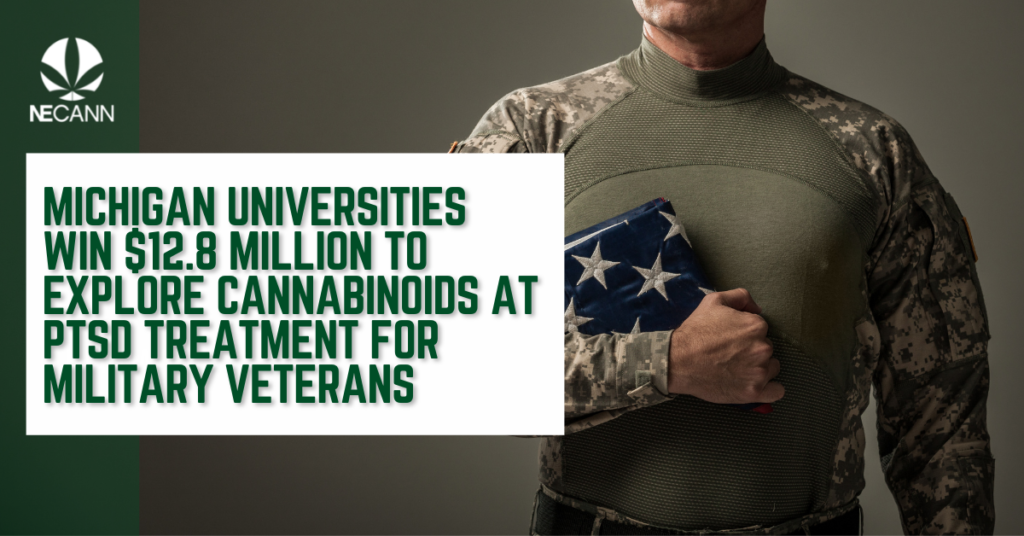In order to study the possible benefits of marijuana for veterans with PTSD, Michigan is funding $12.5 million towards cannabis research projects at two colleges.
The Michigan Cannabis Regulatory Agency is funding research at Wayne State University School of Medicine and the Eugene Applebaum College of Pharmacy and Health Sciences to study the potential therapeutic benefits of cannabis for veterans suffering from post-traumatic stress disorder (PTSD).
The research will include two large-scale randomized controlled clinical trials over five years to evaluate the efficacy of cannabinoids for U.S. military veterans living in MI. The trials will be supported by Redbud Roots Inc., a Michigan-based cannabis company.
“In study one, 200 veterans will be randomized into one of four different THC-CBD dose mixtures for a 12-week treatment phase, with one week’s worth of cannabis delivered by a mobile health unit staffed by security as well as research assistants who will secure blood and urine samples on site.
In study two, 150 veterans will be randomized into either a naturalistic group that will be followed as they continue to use cannabis as they normally do (observation only), or into a “THC reduction group” in which veterans are asked to switch from their typical cannabis product to using a lower THC/higher CBD product. Adherence to this switch will be incentivized using contingency management.”
This is a major step forward in the research of marijuana as a potential treatment for conditions like PTSD and chronic pain, and it could pave the way for other states to follow suit.
“Public opinion has really outpaced science in terms of cannabinoid therapeutics,” said Dr. Leslie Lundahl, an associate professor in the Department of Psychiatry and Neurosciences at the Wayne State University School of Medicine. “There are animal data that suggest it might be helpful, there are anecdotal reports that it might be helpful for pain or for PTSD or mood or anxiety, but we don’t really have any hard scientific data to really support that.”
According to a report from WXYZ Detroit, Leslie Lundahl, Ph.D. is the lead principal investigator on the five-year project, “Wayne State Warriors Marijuana Clinical Research Program: Investigating the Impact of Cannabinoids on Veteran’s Behavioral Health.”
Dr. Lundahl is a research educator who is interested in understanding how substance use disorders develop and how they can be treated. She works with the Translational Neuroscience Graduate Program and Drug Lab Detroit, a multidisciplinary team at the School of Medicine.
“This project is timely and important because, despite increasing medicalization and legalization of cannabis use across the United States, the safety and effectiveness of therapeutic cannabis/cannabinoids are not yet well established,” Dr. Lundahl said. “Community support of legal cannabis and the perception that cannabis is safe indicates public opinion has outpaced science on cannabis use. There are risks to heavy and chronic use, including impairments in attention, learning, and memory, as well as increased risk of mental health problems such as anxiety and depression, and medical issues such as heart attack and lung irritation. At the same time, cannabinoid science is rapidly expanding and it is likely that some of these compounds can help treat common conditions.”
According to a report from Ganjapeneur, one of the trials, “Wayne State Warriors Marijuana Clinical Research Program: Cannabinoid Adjunct to Prolonged Exposure and Recovery,” seeks to establish whether cannabis combined with Prolonged Exposure (PE), an empirically-based behavioral treatment for PTSD, can improve therapeutic outcomes for veterans diagnosed with the condition.
Dr. Lundahl also said that CBD and THC have the potential to make PE more effective: “Post-traumatic stress disorder is a debilitating condition that often affects U.S. Armed Forces veterans and can lead to increased risk for suicide. One of the most effective treatments for PTSD is Prolonged Exposure therapy, but many military veterans discontinue PE and more than a third who complete PE do not experience symptom improvement. There is an urgent need to develop treatments for PTSD, particularly focused on improving quality of life and mental health symptoms.”
“Specifically, we’re looking at PTSD symptoms severity and then frequency and severity of suicidal thoughts and behavior,” Lundahl said.
According to the U.S. Department of Veterans Affairs 2020 National Veteran Suicide Prevention Annual Report, more than 6,400 veterans died by suicide in 2018, more than 17 suicides per day. Despite making up only 8% of the population, veterans accounted for 14% of all suicide deaths in U.S. adults.
The study will not only test cognitive function and monitor vitals, but also blood, urine, and saliva samples. They hope to find lower levels of THC in regular users that would produce more effective results.
“That’s important because we know as you go higher in the concentration and level of THC, there are greater risks to using it,” Lundahl said. “Especially if you are using it chronically.”
They’ll use different doses with different studies, working to enlist the help of 350 veterans. One of the studies is using Michigan cannabis from Redbud Roots, according to Wayne State University.
“To me, the biggest thing is the ability to be able to talk about cannabis and veterans in the same sentence,” Redbud Roots COO and co-founder Alex Leonowicz said. “Five years ago, you couldn’t even talk about it or mention if you use it, but now fast forward, you have some of the largest institutions in the state of Michigan studying its impact on mental health.”




